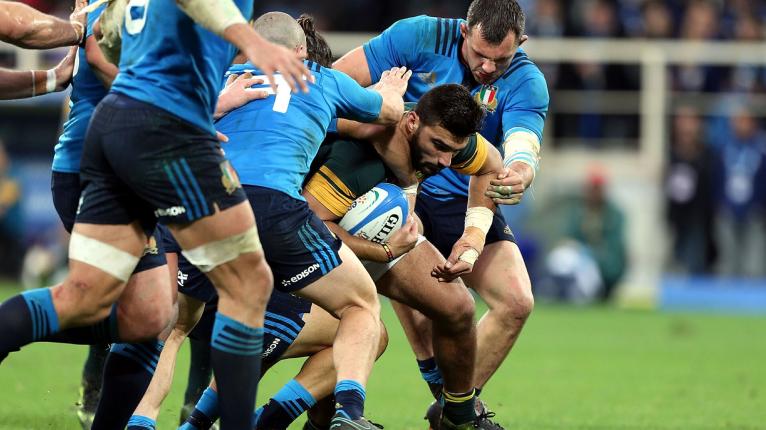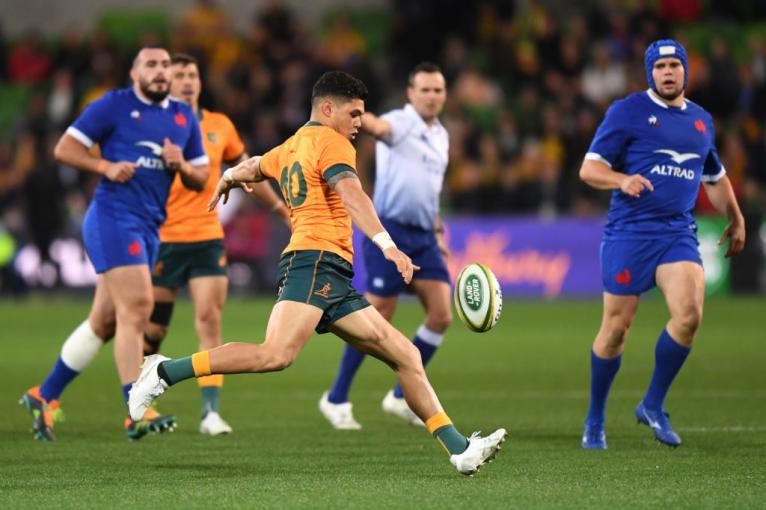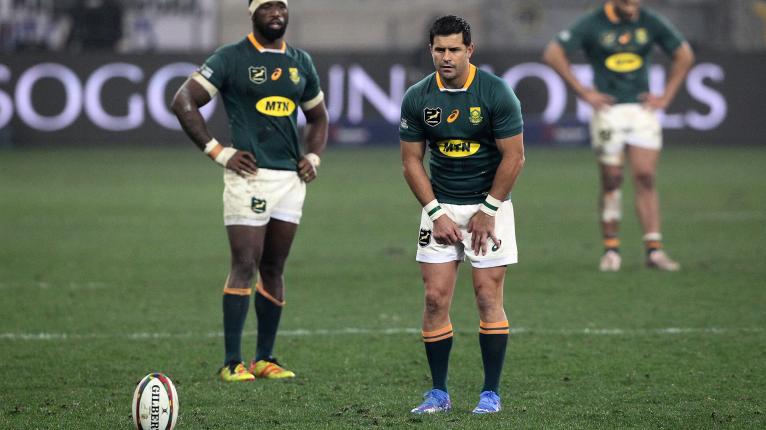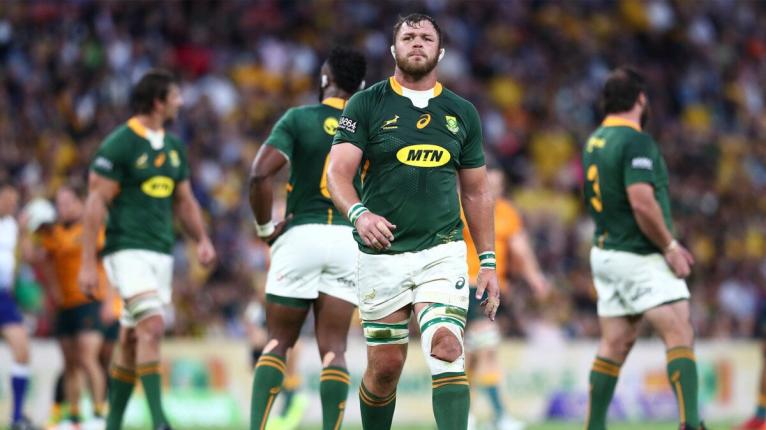It may have taken two years to the day, but the Springboks have finally started rebuilding following their Rugby World Cup triumph in 2019.
South Africa entered the last tournament ranked only behind New Zealand as favourites to take home the spoils and despite going down to the All Blacks during the pool stages, it was Siya Kolisi who raised the trophy come the competition’s end.
To even be as highly tipped as they were going into the World Cup was a testament to the work that Rassie Erasmus had accomplished over the prior two years.
In 2016, the Springboks suffered eight losses, including a first defeat in Argentina to the Pumas, a record 57-15 thumping in Durban by New Zealand, and a humiliating 20-18 loss to perennial tier-one whipping boys Italy.
Things didn’t go much better in 2017, with South Africa managing just two wins from their final eight outings, besting France by a point in Paris and getting revenge against Italy in Padua. Throughout that period, they suffered record defeats to Ireland and New Zealand while also failing to beat Wales and Australia.

Somehow, Allister Coetzee maintained his role as head coach until the beginning of 2018, when Erasmus was eventually shifted into the position after having already conveniently taken over as director of rugby for the South Africa Rugby Union a few months earlier.
The turn-around in fortunes wasn’t immediate, but Erasmus did quickly stamp his own mark on the team. In their first game of the year, an exhibition match against Wales in Washington DC, thirteen players were handed their test debuts: Ox Nche, Jason Jenkins, Kwagga Smith, Ivan van Zyl, Makazole Mapimpi, Andre Esterhuizen, Travis Ismaiel, Akker van der Merwe, Thomas du Toit, Marvin Orie, Skhimbuzo Notshe, Embrose Papier and Robert du Preez.
Later that season, the likes of RG Snyman, Aphiwe Dyantyi, S’bu Nkosi, Marco van Staden, Damian Willemse and Cheslin Kolbe were also introduced to the test arena.
All in all, Erasmus brought in 19 players in 2018 and a further four the following season, totalling 23 new caps.
Erasmus, of course, had just two seasons to prepare his charges for Japan 2019 and, as history has shown, that was all the time he needed to take a team with one of the most successful records in rugby history from an underperforming hot mess, to world champions.
By comparison, Steve Hansen introduced 15 players to the All Blacks over that same two-year period (with eight earning their first appearances against Japan in 2018), and Michael Cheika handed debuts to 13 players.
Hansen and Cheika, however, weren’t newly introduced coaches. Hansen started his reign in 2012 while Cheika took over as the Wallabies head honcho two years later. The pair had been building towards the 2019 Rugby World Cup from as soon as the previous one had come to a close – when the All Blacks triumphed over their trans-Tasman neighbours in the grand final at Twickenham in 2015.
Erasmus, of course, had just two seasons to prepare his charges for Japan 2019 and, as history has shown, that was all the time he needed to take a team with one of the most successful records in rugby history from an underperforming hot mess, to world champions.
While the Springboks are by no means in the same situation now as when Erasmus first took over, they’re certainly in a more challenging position than their many international rivals.

The SARU made the decision to withdraw the Springboks from test rugby in 2020 and while the likes of NZ, Australia and Argentina may have only played a handful of matches each, they were still able to spend ample time together as a squad and introduce a host of new players to the mix.
22 players made their debuts across the three teams that competed in the 2020 Tri-Nations competition, while the Northern Hemisphere unions averaged a similar number of new caps from their interrupted season.
The time in the saddle together last year also meant that when the 2021 international campaign kicked off, most nations quickly found their groove. They also had the benefit of playing understrength sides from the Pacific Islands, France and Wales. As such, they were again able to welcome a host of new players into their midsts.
In total, the All Blacks and Wallabies have both dished out seven new caps this season while nine Pumas have been introduced to the test arena.
With Jacques Nienaber now at the helm, South Africa have blooded just six players this year. Perhaps even more crucially, they’ve by and large stuck to the same 23 players throughout the season, except when injury has forced their hand.
The Springboks, meanwhile, were able to get one game under their belt against Georgia before taking on the British and Irish Lions in a once-in-a-blue-moon series that came ever so close to not being able to go ahead at all.
Unsurprisingly, the Springboks took no chances with that series and opted for an extremely conservative approach, both in terms of gameplay and selection.
With Jacques Nienaber now at the helm, South Africa have blooded just six players this year. Perhaps even more crucially, they’ve by and large stuck to the same 23 players throughout the season, except when injury has forced their hand.
Some men, like Jasper Wiese, Kwagga Smith, Cobus Reinach and S’bu Nkosi have taken on more duties in 2021 due to the absences of Duane Vermeulen, Pieter Steph du Toit, Faf de Klerk and Cheslin Kolbe but, in general, Nienaber has hugely relied on the World Cup winners from 2019 to guide them through the formative stages of the season.
That’s no major surprise, given that South Africa are a year behind their international rivals in terms of looking towards 2023, but even when there have been some understandable calls for change from the wider public, Nienaber has resisted.

Typically reliable players like Handre Pollard, Lukhanyo Am and Willie le Roux, who starred during the 2019 World Cup, have all looked behind the 8-ball at times this season but even with the likes of Elton Jantjies, Andre Esterhuizen and Damian Willemse waiting in the wings, Nienaber hasn’t budged.
In fact, those young players have often missed out on the squad or match-day 23 altogether. One 37-year-old Morne Steyn was even recalled into the national side – though he obviously repaid that favour in spades by again kicking the series-deciding penalty goal against the Lions.
When Nienaber has chosen to utilise his less experienced bench options throughout the season, especially his back-up halves, it has often been in the dying minutes of games where players have had few chances to build into the game and flourish.
The big issue for the Springboks, particularly in the forwards, is that those players that they’re relying on from the 2019 World Cup were entering their twilight years even when they triumphed two seasons ago.
What happens if one of Handre Pollard, Lukhanyo Am or Malcolm Marx suffers a long-term injury in the lead-up to France? Will their substitutes with limited experience under the belt be able to handle the pressure of the game’s showpiece tournament?
That’s not to say they’re no longer performing, but we’ve seen in the past that injuries can suddenly pile up for older players and form can quickly tumble, relative to their younger counterparts.
Will Vincent Koch, Trevor Nyakane, Duane Vermeulen, Francois Steyn and Willie le Roux still be the best in their positions in 2023? And what happens if one of Handre Pollard, Lukhanyo Am or Malcolm Marx suffers a long-term injury in the lead-up to France? Will their substitutes with limited experience under the belt be able to handle the pressure of the game’s showpiece tournament?
The fact is, no one can say for sure – which is exactly why the Springboks are in an admittedly slow-paced race against time.
The signs are positive, however, that the rebuild is finally starting to properly get underway, with Nienaber today naming his side to face Wales this weekend and selecting a few less experienced players, including prop Ox Nche, scrum-half Herschel Jantjies and fullback Damian Willemse.

Collectively, that trio has just 10 starts between them and all could prove hugely important ahead of the 2023 World Cup.
“Damian and Herschel have featured off the bench a fair bit and this is an opportunity to give them a chance to start as we look to build our squad depth ahead of the 2023 Rugby World Cup,” Nienaber said following the team announcement.
“We know what we have in [usual fullback] Willie [le Roux]and, if we had to play a World Cup final on the weekend, we would probably select Willie because of his experience and what he has done for us in the past.
“But this is an ideal situation to allow Damian to settle himself into the fullback position. It’s a little side project.
“We always want to win but we want to develop and transform and this is an ideal opportunity for us to get some experience into guys on this end-of-year tour.”
While Wales may have been put to the sword by the All Blacks, they’re still a strong side and will benefit from the return of a few key players this weekend. There’s also the small factor that the Springboks haven’t beaten Wales on an end of year tour in Europe in over a decade. As such, Nienaber is entrusting his young players with big-game starts – a relative first for the still fresh international coach.
It may have taken the Springboks more time to start their post-World Cup rebuild than other nations, with the global pandemic, the scheduling of the Lions tour and the understandable desire to preserve their status as the number one ranked team in the world all playing their parts in that delay, but the green and gold machine is finally starting to rumble into action.



Comments
Join free and tell us what you really think!
Sign up for free